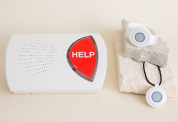Bay Alarm Medical Proudly Sponsors Pets For The Elderly Foundation
February 4, 2014
We’re pleased to be sponsoring a charity that is very close to our hearts over the next few months: The Pets For The Elderly Foundation.
Many of our employees here at Bay Alarm Medical have furry friends at home. Our pets help us stay balanced and provide support in our everyday lives. We know, firsthand, the effects that a pet can have on a person’s well-being.
Throughout this post, we’ll explain what The Pets For The Elderly Foundation does, share with you the amazing benefits that pets have on human health, and show you how you can get involved.
Check out our neat infographic on how pets keep seniors happy and healthy!
What Pets For The Elderly Foundation Is Doing
Pets For the Elderly Foundation pays a portion of the adoption fee when a senior citizen (age 60 and up) adopts a pet from one of their participating shelters. This covers pre-adoption vet exams and spay/neuter if that is part of the adoption fee.
For every sale we get over the next two months, we’ll donate a portion of our profits to Pets for the Elderly Foundation. We aim to help them keep doing their great work of uniting seniors and pets all across America.
Health Benefits of Having Pets
Pets are not just companions, they can also help seniors with anxiety, stress, and loneliness.
Stress Reduction
Pets can help buffer the effects of stress on their owners. One important journal article revealed that pet owners also made fewer trips to the ER than non-pet owners over the course of a year.
This article also showed that pets can have an impact on coping ability, as older people with pets were better able to battle depression and bounce back after a tragedy.
Increased Mood
When we humans interact with pets, it increases our level of Oxytocin, a hormone that makes us feel happy and trusting. Surveys have shown that pet owners tend to be less lonely than those without pets.
Strong Emotional Bond
The emotional bond between human and animal can be as strong as that between family members. This is evidenced by the fact that a health review journal revealed that in large polls of over 1,000 pet owners, most owners viewed their pets as being “as much a part of the family as any other person in the household.” This companionship made them feel more secure than non-owners.
It is common for retirees to feel a sense of emptiness, without the daily routine of work. Having a pet can allay these feelings. Caring for pet creates a new role for the retiree as pet owner or pet parent. Pets can mimic the support of a friend, child, or even a parent.
Memory Improvement
Having pets may even help with memory too. For those with memory loss, petting animals can help trigger lost memories.
Pets can help Alzheimer’s patients, as petting a dog can sometimes trigger lost memories. In her book titled “Saved: Rescued Animals and the Lives They Transform,” Karen Winegar, a well-renowned psychologist, noted that one woman with Alzheimer’s who could no longer recognize her husband was still able to recognize their family dog.
Increased Sociability and Self-Esteem
In an in-depth study on the effects of pets on health, people with pets reported a higher sense of self-esteem and well-being than non-owners.
These pets were able to help fulfill social needs for those who had no human companions, and acted as compliment social supports to those who did have close human relationships already. Rather than interfering with, or taking the place of, human relationships, pets appeared to enhance existing human relationships.
Healthy Heart
A psychological study on health and well-being conducted in the 1980s showed that heart attack patients who owned pets lived longer than those who didn’t. Additional studies have found that petting an animal can even lower blood pressure.
Higher Fitness Level
Pets help motivate their owners to commit to a daily fitness routine. Dog owners have to wake up to take the dog out, feed them, bathe them, play with them, and take them out for walks in the evenings.
Pet owners tend to get more exercise than non-pet owners. They spend more energy (playing with pets) and tend to get out more than those who don’t have pets. This is especially true of dog owners who take their dogs for walks daily. These activities can help seniors increase their physical agility.
Positive Effects of Therapy Animals
When therapy animals come to visit residents in institutional settings, their presence causes older adults to smile more, engage in conversation more, and display increased alertness and attention.
The National Institutes of Health examined the use of pet therapy in nursing homes, and found that animals acted as social catalysts in helping to start conversations. They also helped boost the morale of the inhabitants.
Therapy dogs provide wheelchair patients with a source of social stimulation that is even more constant than that of humans. People in wheelchairs may feel isolated socially when they are alone, but are more likely to be approached by people when they have pets with them.
Added Sense of Security
Having a pet can help owners feel more secure when they are home alone. Pets can alert their owners to the presence of intruders, and some can even be trained to detect signs and symptoms of illness (like seizures). They can also chase off pests like mice and other vermin from the home.
Where You Can Find Pets
You can check The Pets For The Elderly Foundation’s website to find a participating shelter near you.
How You Can Help
Make a monetary donation here to help The Pets For The Elderly Foundation continue helping seniors adopt pets. For any medical alert system purchase that you make with us over the next two months, a portion of that sale will go towards supporting The Pets For The Elderly Foundation.








